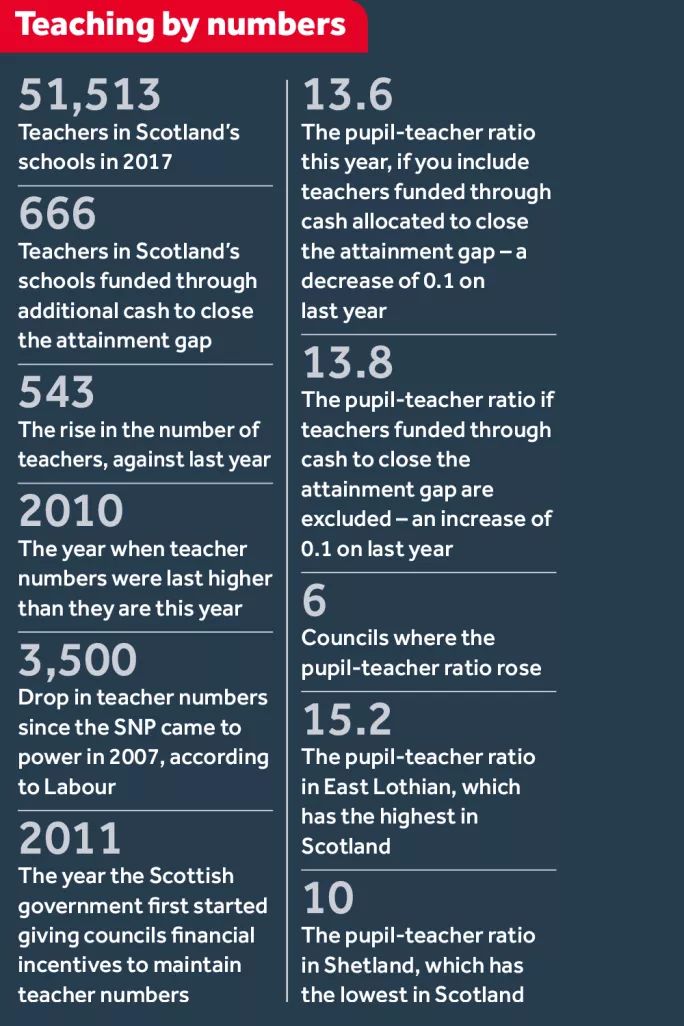- Home
- Councils ‘won’t be able to maintain teacher numbers’
Councils ‘won’t be able to maintain teacher numbers’

Councils are warning that they cannot be held accountable for maintaining teacher numbers in the future if the government goes ahead with its plan to give headteachers the power to dictate how their schools are staffed.
The warning from Stephen McCabe, the children and young people spokesman for council umbrella body Cosla, came as new figures published this week showed that the total number of teachers working in Scottish schools had risen to its highest level since 2010.
“If the new situation is one where headteachers determine the make-up of staff in their schools then it will be headteachers who determine if they would rather have, for instance, more additional support needs assistants than teachers,” Mr McCabe said. “How can councils be held to account for overall staffing ratios if responsibility for staffing is devolved to headteachers?”
Controlling recruitment
Education secretary John Swinney recently revealed that, as part of the government’s plans to devolve more control to headteachers, he intended to give school leaders the ability to select their own staff teams.
The government consultation on the new Education Bill, entitled Empowering Schools, published last month, says: “Ultimately, a headteacher must be able to select the team with whom they work.”
However, responding to Mr McCabe’s comments, Mr Swinney told Tes Scotland that a lot of discussion had yet to take place around how the education reforms would work in practice.
He added: “Anyone that suggests we should not have a strong number of teachers within the teaching profession, I think, is rather missing the point. The centrality of teachers in the education system - whichever way you look at it - is a key contributor to the educational success Scotland is now seeing and wants to see more of.”
Meanwhile, the general secretary of the EIS teaching union, Larry Flanagan, said he did not accept Mr McCabe’s analysis of the government’s plans.
Councils would continue “to assert their role as employer” and, therefore, “should still be responsible for delivering teacher numbers on the ground”, he said.
The Scottish government has given councils financial incentives to maintain teacher numbers since 2011.
Official government figures show the number of teachers working in Scotland grew by 1 per cent or 543 teachers, rising from 50,970 last year to 51,513 this year.
The increase in staff for the second year in a row can be attributed to the £750 million Attainment Scotland Fund (ASF), which was designed to drive up the attainment of disadvantaged children.
Mr Flanagan welcomed the rise but warned that if the 666 teachers paid for by the ASF - who would often be on fixed-term contracts - were removed from the figures, “you are looking at a different scenario”. He argued that these “attainment teachers” should be over and above core staffing because “they are meant to be focused entirely on closing the attainment gap”.

When ASF teachers are excluded, the figures show that the pupil-teacher ratio actually rose from 13.7 last year to 13.8 this year, meaning that councils failed to deliver on their promise to maintain teacher numbers.
“Issues around the recruitment of teachers and proper remuneration still remain centre stage,” Mr Flanagan concluded.
Education directors also welcomed the rise in teacher numbers but warned teacher recruitment difficulties continued to plague schools - especially regarding supply teachers. The president of the Association of Directors of Education in Scotland and Glasgow’s director of education, Maureen McKenna, told Tes Scotland that Glasgow was having a “terrible time with supply staff” as winter bugs hit, leading to staff absences.
Glasgow had been forced to move teachers between schools in order to ensure pupils did not have to be sent home because of the lack of cover teachers available, she said.
Nonetheless, Ms McKenna said she wanted to see a move away from a focus on inputs such as teacher numbers and towards output measures such as improving attainment and pupils’ destinations after school.
Mr Swinney refused to be drawn on whether or not the government would be striking another deal with councils to maintain teacher numbers in the coming financial year.
He said that any plans would be announced by the finance secretary Derek Mackay yesterday (Thursday) - after Tes Scotland went to press.
However, both Mr Flanagan and Mr McCabe said they expected maintaining teacher numbers to be part of the local government settlement - although Mr McCabe pointed out that if headteachers are given more control over staffing, he remains to be convinced it is a deal councils will be able to sign up to in future years.
For more information on teacher numbers, visit bit.ly/TeacherNumbers
Keep reading for just £1 per month
You've reached your limit of free articles this month. Subscribe for £1 per month for three months and get:
- Unlimited access to all Tes magazine content
- Exclusive subscriber-only stories
- Award-winning email newsletters



